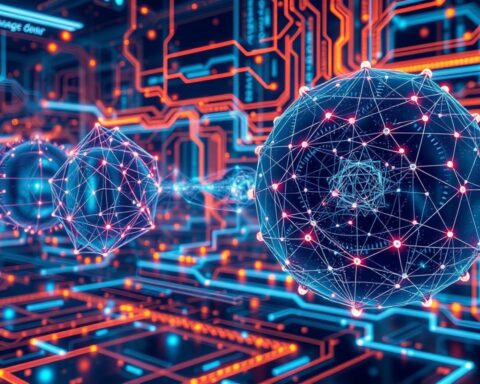Quantum computing is making big strides, with new achievements in error correction and entangling gates1. This is big news for artificial intelligence. It could change many industries that use quantum computing. We’ll look at the challenges of combining quantum computing with AI and how it might change AI.
Studies have found that error-correcting codes get more accurate with size1. Microsoft and Quantinuum have also made a breakthrough. They showed two-qubit entangling gates with much lower errors than before1. For more on AI, check out artificial intelligence for the latest news.
Key Takeaways
- Quantum computing has the power to change many industries, including those that use quantum computing a lot.
- Combining quantum computing with AI could lead to big advancements in artificial intelligence.
- Recent breakthroughs in error correction and entangling gates are important for AI.
- Studies show that bigger error-correcting codes are more accurate1.
- Microsoft and Quantinuum have made a big discovery in entangling gates with lower errors1.
- Experts think we could see hundreds of fault-tolerant qubits and millions of gates in the next decade1.
Understanding the Fundamentals of Quantum-Boosted AI
Quantum-boosted AI is a new field that mixes quantum computing and AI. It aims to make systems more powerful and efficient. This mix could change many industries, like healthcare, finance, and logistics.
Recent studies show quantum AI can make drug discovery faster and cheaper. It does this by quickly simulating how molecules interact2.
Knowing the basics of quantum computing is key. This includes how it processes data and uses both quantum and classical models. Quantum algorithms, like quantum k-means clustering, can solve problems faster in fields like logistics3.
Creating quantum-driven machine learning algorithms is important. It helps solve the challenges of quantum technology and AI complexity.
Quantum Computing Basics for AI Applications
Quantum computing started in the 1970s and is now used in real applications. Big tech companies like IBM, Google, and Microsoft are investing a lot in it3. Quantum computers are great at recognizing patterns, which is very useful in cybersecurity.
Core Principles of Quantum-AI Integration
Combining quantum computing and AI makes training machine learning models faster. It can go from hours or days to just minutes2. Quantum algorithms can also explore more possibilities, leading to better results in drug discovery and materials science4.
For more on quantum AI, check out quantum AI research. The benefits of quantum-boosted AI are huge. Researchers are working hard to solve the challenges of developing quantum-driven AI algorithms.
| Industry | Potential Benefits of Quantum-Boosted AI |
|---|---|
| Healthcare | Reduced time and cost of drug discovery |
| Finance | Improved risk assessment and investment strategy optimization |
| Logistics | Real-time route optimization and improved supply chain efficiency |
Technical Barriers in Quantum Computing Implementation
Quantum computing could change many fields like healthcare, finance, and transport. It uses quantum computing to solve hard problems. But, there are big technical hurdles, like needing better quantum gates and scaling up systems5. Adding AI to quantum tech could make systems learn and decide much faster, solving problems quicker5.
One big problem is the high error rate from qubit instability and decoherence. To fix this, we need better quantum error correction6. Also, quantum computers can’t handle big datasets needed for AI, limiting their use6. New tech, like AlphaQubit, is being explored to cut down errors6.
Getting quantum supremacy in ai is key. It means quantum computers can simulate molecular interactions faster than classical ones. This could help in drug discovery and materials science5. Despite hurdles, the quantum computing market is growing fast, showing more people are interested5. To move forward, we need to work together to make quantum computing better and more scalable7.
Here are some key statistics highlighting the challenges and opportunities in quantum computing:
- About 60% of quantum operations face high error rates from qubit instability and decoherence5.
- AI and quantum tech together could make systems learn and decide much faster, solving problems quicker5.
- Quantum computers could be millions of times faster than the fastest microchip computers today6.
Challenges of Quantum-Boosted AI in Modern Applications
Quantum computing and AI together could change many industries. But, they also bring big challenges. One big issue is the complexity of AI algorithms, which can cause errors in results8. Also, problems like decoherence and error correction can slow down the making of reliable quantum-AI systems9.
Some main challenges of quantum-boosted AI include:
- Decoherence and error correction issues, which can lead to errors and inconsistencies in the results9
- Scaling limitations in quantum systems, which can limit the complexity of the problems that can be solved8
- Resource management challenges, which can make it difficult to optimize the performance of quantum-AI systems10
Despite these challenges, researchers and companies are working hard to find solutions. For example, Nvidia is key in advancing AI and quantum computing. They are making special hardware and software for these fields10. By tackling these challenges, we can fully use quantum-boosted AI and change many industries.
Developing Quantum-Ready AI Algorithms
We’re looking into making AI work better with quantum computing. This could make AI smarter at understanding language and making decisions. But, there are big challenges to overcome.
Creating these advanced AI algorithms needs a lot of knowledge in both quantum computing and AI11. New tools are needed to tackle the tough problems in quantum computing. AI can also help make quantum devices work better by reducing noise11.
Some cool things we might see with these new AI algorithms include:
- Smarter natural language processing
- Better decision-making
- Optimizing complex systems
These could lead to big savings, like up to 30% in buying things with GenAI12.
To learn more about how algorithms help make businesses run on their own, check out this link. Making quantum-ready AI is a big job, but it could change many fields for the better.

Practical Solutions for Quantum-AI Integration
Researchers are working hard to use quantum computing in AI. They face big challenges like quantum supremacy in ai and ai development challenges. To solve these problems, they are finding new ways, like using hybrid computing and reducing noise, to fully use quantum computing’s power13.
To tackle these issues, they are looking into quantum error correction techniques. These methods can lower errors in quantum computers. They are also using machine learning to make quantum computers work better14.
Quantum-AI integration brings many benefits, such as:
- Speeding up processing
- Boosting machine learning
- Better decision-making
These advantages come from using quantum systems’ special features, like superposition and entanglement. This helps create more powerful AI algorithms13.
By tackling the challenges of quantum-AI integration, researchers can unlock its full power. This will lead to new discoveries in many areas, like finance and healthcare14.
| Benefits | Challenges |
|---|---|
| Amplified processing speed | Quantum noise and error correction |
| Enhanced machine learning | Scalability and integration |
Conclusion: The Future Landscape of Quantum-Enhanced AI
Looking into the future of quantum-enhanced AI, we must weigh its challenges and benefits. Companies like Nvidia are leading the way in AI and quantum computing. They’re creating special hardware and software for these fields. This could make data processing faster, improve decision-making, and boost processing power15.
Quantum computing could change many industries, like healthcare and finance. It offers efficient and accurate solutions to tough problems. For example, quantum-enhanced AI can enhance natural language processing. This leads to better customer service and more accurate predictions16.
To reach these goals, we must tackle quantum-boosted ai’s challenges. We need to solve decoherence and error correction issues. We also need to develop stronger quantum algorithms17.
In summary, quantum-enhanced AI’s future looks bright. It has the power to transform many industries and solve complex problems efficiently. As we improve quantum computing, we’ll see big leaps in AI. This will lead to better decision-making and more power15. With the right investment and research, we can fully harness quantum-enhanced AI’s power17.
FAQ
What are the challenges of quantum-boosted AI and its applications?
What are the fundamentals of quantum-boosted AI, including quantum computing basics and its applications in AI?
What are the technical barriers that hinder the implementation of quantum computing in AI applications?
What are the challenges of quantum-boosted AI in modern applications, including decoherence and error correction issues?
How can quantum-ready AI algorithms be developed, and what are the challenges and opportunities associated with this development?
What are the practical solutions for quantum-AI integration, including hybrid computing approaches and noise mitigation strategies?
What is the current state of quantum computing and its impact on various industries?
How can the challenges of quantum-boosted AI be overcome, and what are the benefits of integrating quantum computing with AI?
What is the future landscape of quantum-enhanced AI, and what are the applications and challenges?
Source Links
- And yet quantum computing continues to progress – https://scottaaronson.blog/?p=7916
- Get to Know the Game-Changer: What is Quantum AI? – https://ai-pro.org/learn-ai/articles/the-game-changer-what-is-quantum-ai/
- Quantum Computing and AI: The Future of Technology – https://stewarttownsend.com/quantum-computing-and-ai-the-future-of-technology/
- Quantum Algorithms Boost Generative AI Speed – https://www.visive.ai/news/quantum-algorithms-boost-generative-ai-speed
- Technical, economic, and societal risks in the progress of artificial intelligence driven quantum technologies – Discover Artificial Intelligence – https://link.springer.com/article/10.1007/s44163-024-00171-y
- The Intersection of AI and Quantum Computing: A New Era of Innovation – https://www.hpcwire.com/2024/11/29/the-intersection-of-ai-and-quantum-computing-a-new-era-of-innovation/
- What Are the Challenges & Limitations of Quantum Computing & When Can We Expect It to Become a Mainstream Technology? – https://www.linkedin.com/pulse/what-challenges-limitations-quantum-computing-when-can-we-expect-hpklc
- Quantum Computing and AI: Exploring the Synergies and Future Prospects in Decentralized Networks – https://medium.com/coinmonks/quantum-computing-and-ai-exploring-the-synergies-and-future-prospects-in-decentralized-networks-26ac61971194
- Quantum computing and AI: less compatible than expected? – https://www.polytechnique-insights.com/en/columns/science/quantum-computing-and-ai-less-compatible-than-expected/
- Quantum Computing May Boost AI Capabilities | PYMNTS.com – https://www.pymnts.com/artificial-intelligence-2/2024/quantum-bits-may-boost-ai-capabilities/
- Enabling Quantum Computing with AI | NVIDIA Technical Blog – https://developer.nvidia.com/blog/enabling-quantum-computing-with-ai/
- Quantum computing and AI – A superpower in the making? – https://www.rolandberger.com/en/Insights/Publications/Quantum-computing-and-AI-A-superpower-in-the-making.html
- What is Quantum AI? – https://www.signitysolutions.com/tech-insights/what-is-quantum-ai
- Challenges And Opportunities In Quantum Machine Learning | Restackio – https://www.restack.io/p/quantum-machine-learning-answer-challenges-opportunities-cat-ai
- Will Quantum Computing boost AI? – Mithun A. Sridharan – https://mithunsridharan.com/quantum-computing-ai/
- What is Quantum AI? The Future of Artificial Intelligence Explained | Pragmatic Coders – https://www.pragmaticcoders.com/blog/what-is-quantum-ai
- AI Meets Quantum in the Future – https://medium.com/ai-hub/ai-meets-quantum-in-the-future-d41232c35ca6








